Release: 1.9.2
Date: 24 January, 2024
Added:
- New indicators for Windows APIs related to specific activities
- Implemented flagging for LSASS dump using minidump
- Extracted remote templates inside xTable struct in MS Office documents
- Implemented parser for Debian packages
Changed:
- Renamed OPSWAT Filescan Sandbox to MetaDefender Sandbox
- Expanded malware configuration extractors to encompass the latest and most pertinent threats
- Improved detection of dynamic syscalls using the HellsGate bypass technique
- Enhanced Quishing and Phishing email detection
- Improved the capabilities of Batch, CSV, HTA, JavaScript, LNK, PowerShell, VBA, and VBScript emulation and fine-tuned timeout handling
- Extended log messages to provide better traceability across various system components
Fixed:
- Pinned the installed Docker version to 24 due to the breaking changes introduced in Docker 25
- Enhanced Application Security measures, especially for PowerShell emulation
- Fixed incomplete invitation URLs in User Management
- Resolved file scanning issue when file content was sent to the API in JSON body
- Fixed the MISP format when exporting scan reports
- Refactored functional tests for the Webservice API and resolved potential runtime issues
- Fixed several UTF-8 parsing issues in content parsers (related to HTML & OLE files)
- Ensured that all whitelisted submissions get the Benign verdict
- Improved the stability of concurrent OSINT lookup tasks
Release: 1.9.1
Date: 22 November, 2023
This version is not suitable for a clean installation due to breaking changes introduced in Docker 25. Please use version 1.9.2 or later for clean installations!
Added:
- Integrated OPSWAT Central Management (OCM) into the Web UI: OCM Registration
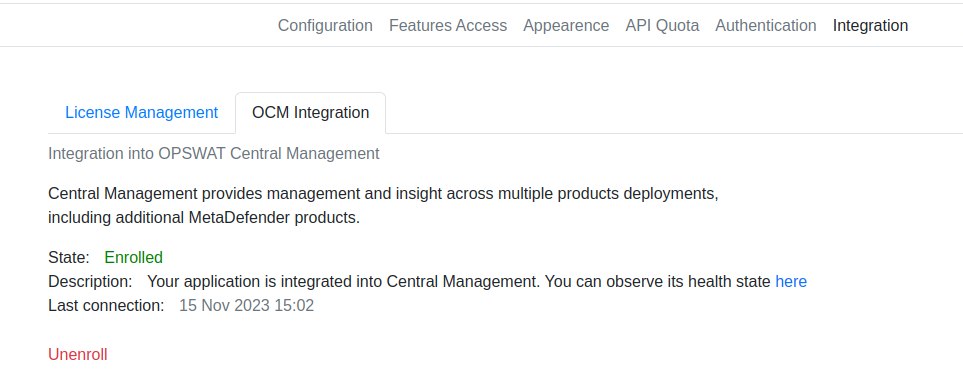
- Automatic email notifications with the original email sender when scanning .eml files: Email Notifications
- Detected and flagged .exe suffixes in URLs to highlight potential downloads of PEs
- Displayed additional Crypto Wallet Indicators of Compromise (IOCs) in scan reports
- Displayed the product's current version in the Web UI footer
- Showcased top malware families in the Trends page
- Identified clickable and non-clickable URLs from documents
- Implemented disassembly of relevant functions in 64-bit executables
- Implemented a parser for .ics files (vCalendar), including the extraction of attached files
- Extended support for JavaScript emulation in Adobe PDF files
- Enabled threat indicator monitoring and statistics support
- Enabled support for all file types when generating an executive summary using OpenAI’s GPT large language model (LLM): ChatGPT (Executive Summary)
Changed:
- Revamped the processing of threat indicators and the methodology behind verdict calculations
- Augmented documentation and introduced an automated system check to verify the utilization of CPUs with AVX support. Technical Requirements
- Expanded malware configuration extractors to encompass the latest and most pertinent threats
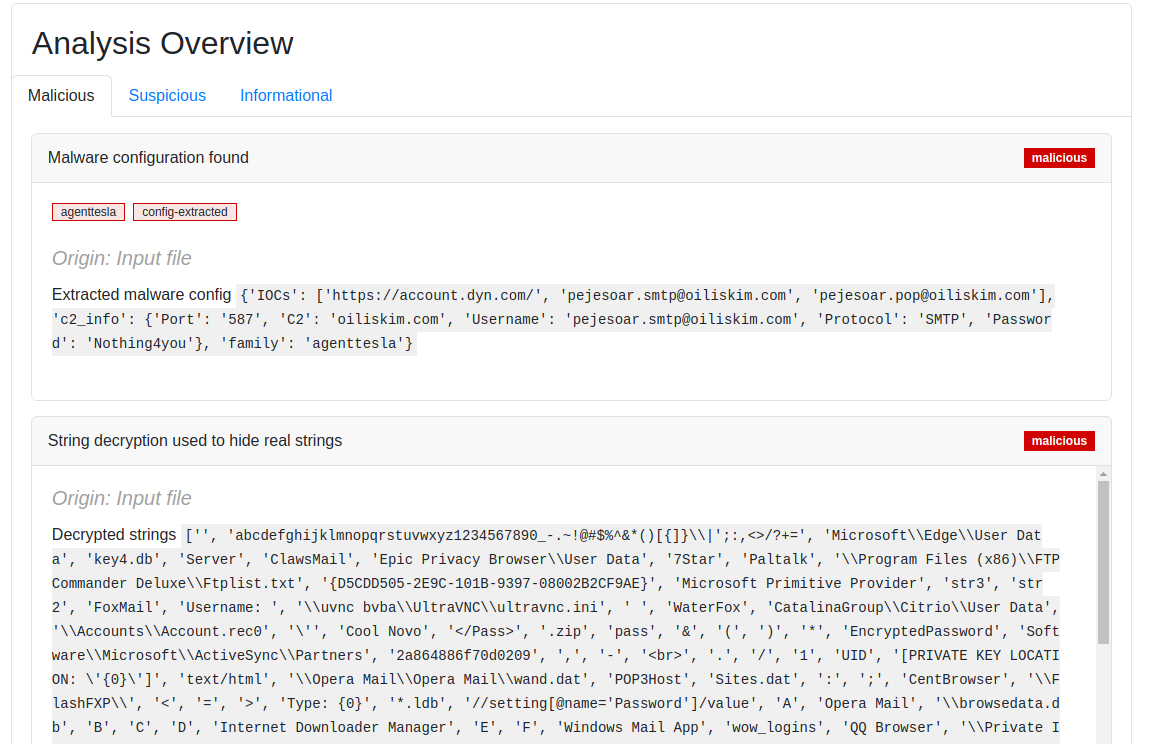
- Implemented the generation of randomized internal passwords for fsBroker and fsTransform components during the installation process
- Upgraded the detection capabilities to more effectively identify malicious office documents
- Improved the extraction process for Crypto Wallets to ensure a more comprehensive and accurate output
- Fine-tuned the extraction of overlay elements in PDF files for increased precision
- Strengthened the system's capability to handle malformed Microsoft Office documents
- Enhanced heuristic domain identification to minimize false positives
- Improved the identification and parsing of VBA content within PDF files
- Enhanced memory management within the scan engine to boost overall efficiency
- Improved parsing for .NET executables for more accurate analysis
- Enhanced parsing for YARA rules to achieve greater precision in matching
- Improved the reporting mechanism for identifying and handling invalid signatures during certificate validation
- Elevated the capabilities of VBA and PowerShell emulation for heightened security measures
- Incorporated confidence values in phishing detections, influencing the final verdict for URL rendering
- Updated the "Download IOCs" button to selectively download items solely from the current page
- Refreshed the internal FSIO fuzzy hash blocklist to encompass emerging threat clusters
Fixed:
- Enhanced Application Security measures
- Improved health check functionality in scan job queues, automatically restarting when required
- Eliminated weak third-party YARA rules to prevent False Positives
Release: 1.9.0
Date: 14 September, 2023
This version is not suitable for a clean installation due to breaking changes introduced in Docker 25. Please use version 1.9.2 or later for clean installations!
Added:
- New License Management interface added to the Web UI: License Activation
- Automatically generate an executive summary with OpenAI’s GPT large language model (LLM): ChatGPT (Executive Summary)
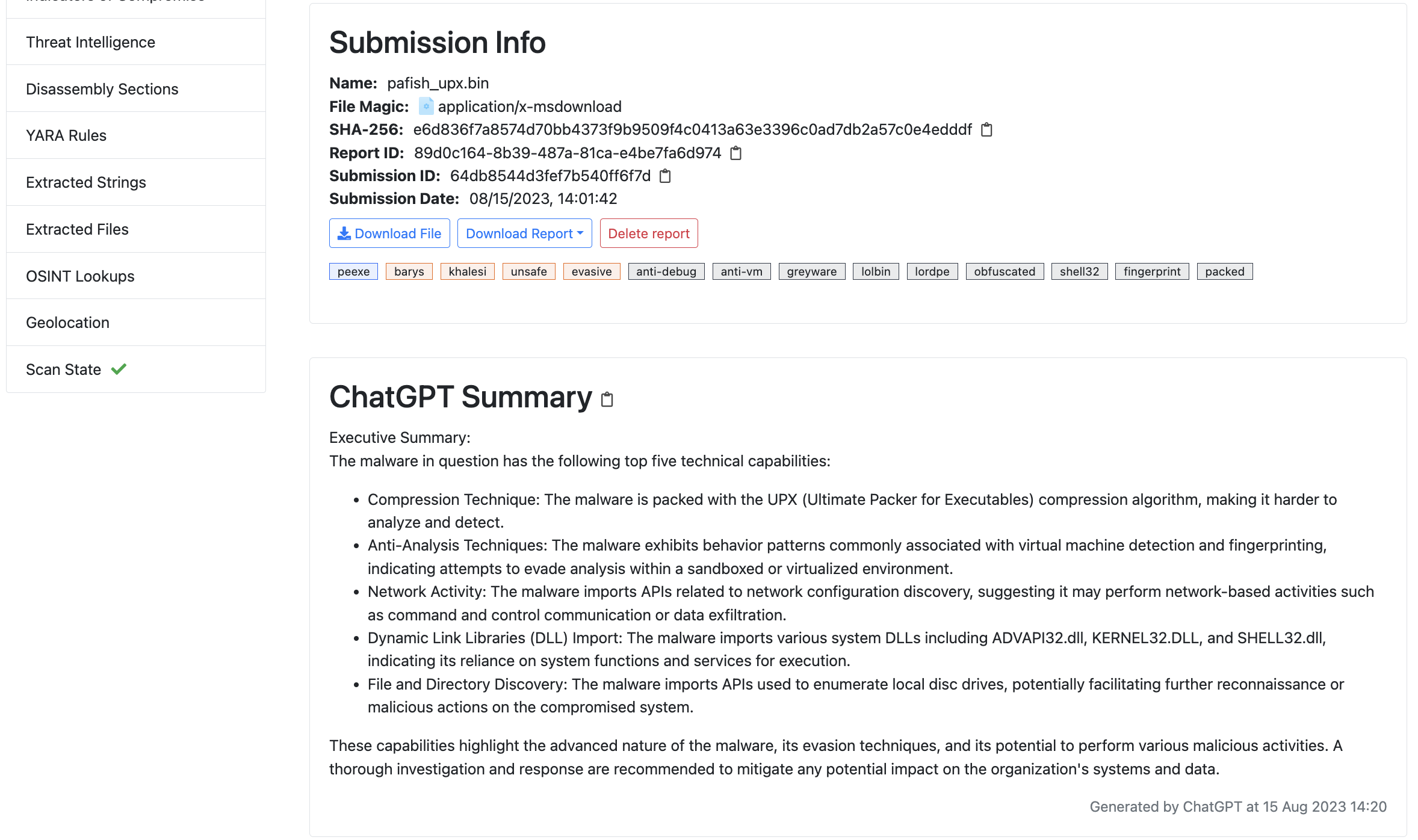
- Support different retention periods for different verdicts
- The /api/scan/file API endpoint accepts base64-encoded file content in the JSON request body
- Support filenames with various unicode characters
- Support unpacking of 64-bit executables
- Integrated "Detect It Easy" to identify characteristics of executable files related to compilation and packing
- Support malicious documents embedded in PDF files hidden as ActiveMime objects in MHTML format
- New threat indicators to detect the WikiLoader malware family (Microsoft Office files)
- Detection and extraction of embedded RTF files in Office documents, as described in CVE-2023-36884
- Detect XOR decoding routine near the executable entry point
- Enhance Threat Indicator for Mavinject
](https://uploads.developerhub.io/prod/XX2D/8pplvmn0ly267eeq3e215xchiyulj183dxclsar858xnmml7pp9niav3lnni9ueq.png)
Adversaries may abuse mavinject.exe to proxy execution of malicious code. Mavinject.exe is the Microsoft Application Virtualization Injector, a Windows utility that can inject code into external processes as part of Microsoft Application Virtualization (App-V) See example and new threat indicator.
Changed:
- Faster scan processing time
- Enhanced logging to provide more relevant information
- Improved VBA emulation to support additional features
- Refined emulation error handling for higher success ratio
- Enhanced threat indicators and verdict calculation
- Improved string analysis
- Optimized disk space utilization & clean-up mechanisms
- Enhanced MITRE mapping for user clarity
- Enhanced flagging for suspicious imported APIs and modules
Fixed:
- Added version locks for dependencies in various emulator components
- Improved application security
- Incorrect detection of zip bombs
- Incorrect condition for the emulation of ActiveMime files
- Improved processing of large sample files
Release: 1.8.1
Date: 14 July, 2023
This version is not suitable for a clean installation due to breaking changes introduced in Docker 25. Please use version 1.9.2 or later for clean installations!
Added:
- Compliance with CIS Level 1 OS hardening: https://www.cisecurity.org/cis-benchmarks
- Detection for fast reverse proxy
- Detection for suspicious file extensions
- Detection for RCE in Office files (leveraged in CVE-2022-30190)
- Collector for identified packer statistics
- Indicator for malicious files with .scr extension
- Flagging for common words used as filename in phishing-delivered artifacts
- Increase brand coverage for phishing detection to support 300 brands
- Possibility to regenerate API key
- Buttons to download certificates and public key files
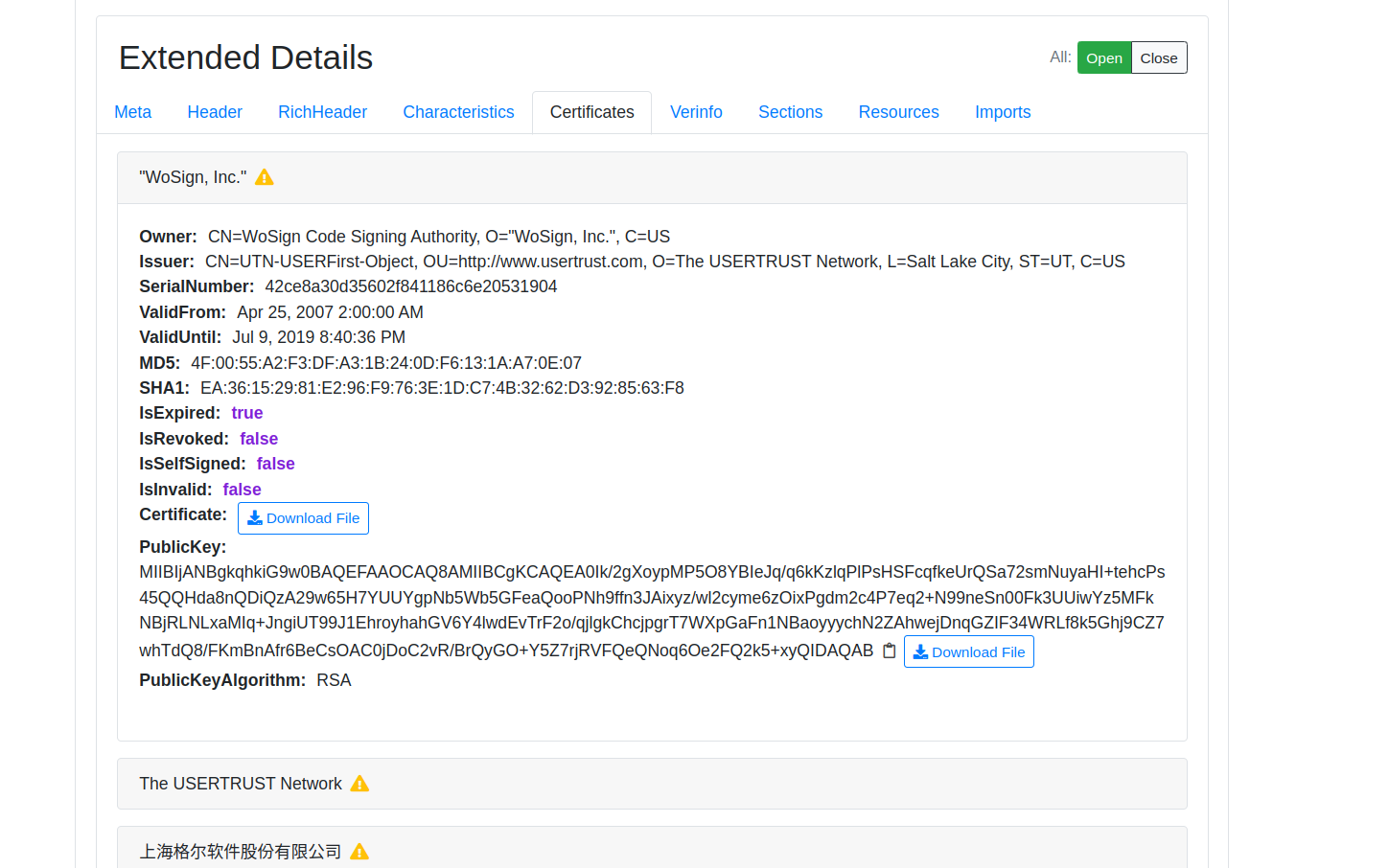
Changed:
- Improved file type detection for more precise accuracy
- Improved VBA emulation to support additional features
- Improved emulation error handling to have a better success ratio
- Improved privacy and handling of personal information
- Improved verdict calculation
- Improved string analysis
- Improved detection and tagging of LOLBins
- Improved analysis of emulation indicators for dynamically allocated Windows APIs
- Improved analysis of URLs to detect commonly abused web services for Command and Control or exfiltration
- Improved logging and logging configuration
- Improved installation process (compatibility with hardened Ubuntu systems)
- Show if advanced scan options have been used
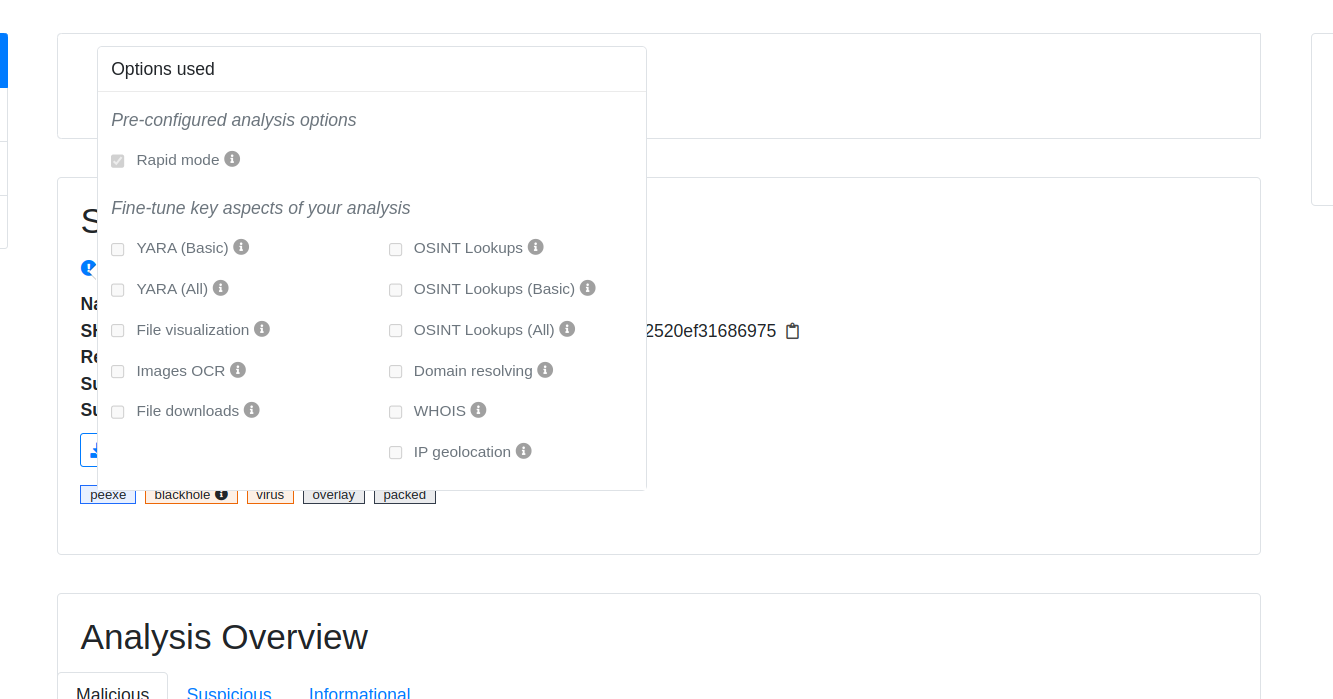
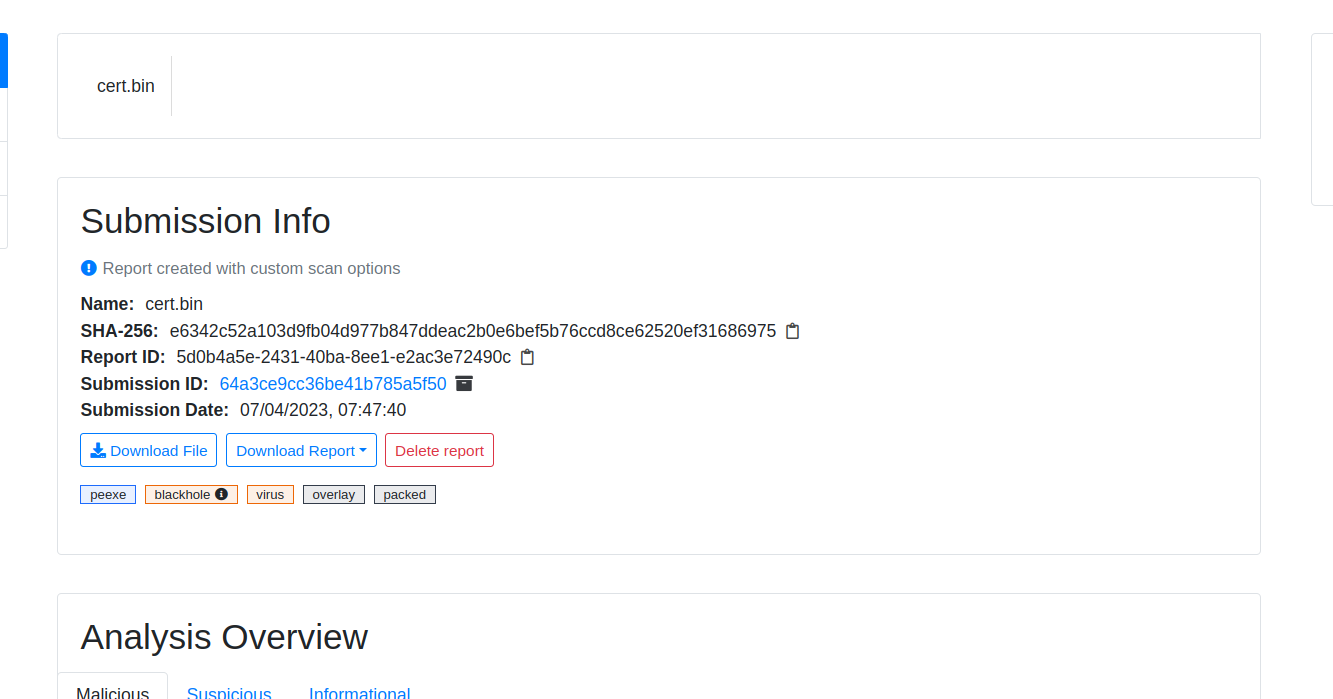
Fixed:
- Added version lock-in for some URL scanning container dependencies
- Fixed a crash that could occur when specific brands were detected (Coinbase, JCB)
- Bugs within YARA rule score parsing
- Issues and incorrect classification with identification and tagging of registry files
- Improved parsing for registry key paths
- Issues and misclassification of OSINT lookups for extracted hashes
- Improved report generator to be resilient against phishing detection failing in the URL scanning task
Release: 1.8.0
Date: 8 June, 2023
This version is not suitable for a clean installation due to breaking changes introduced in Docker 25. Please use version 1.9.2 or later for clean installations!
Added:
- A new single source of truth reputation lookup for Hashes, URLs, IPs, and Domains. Automatically integrated with MDCloud look up. Always yielding a result, independent of whether a report was generated for the search query.
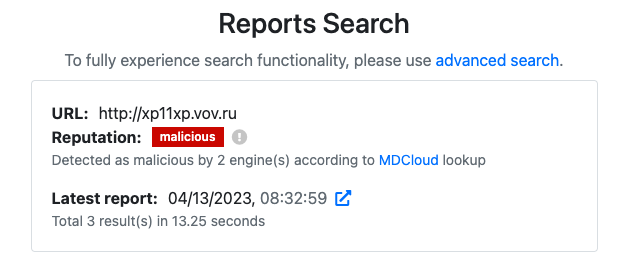
- Threat Intelligence Similarity Search feature for Portable Executable (PE) files
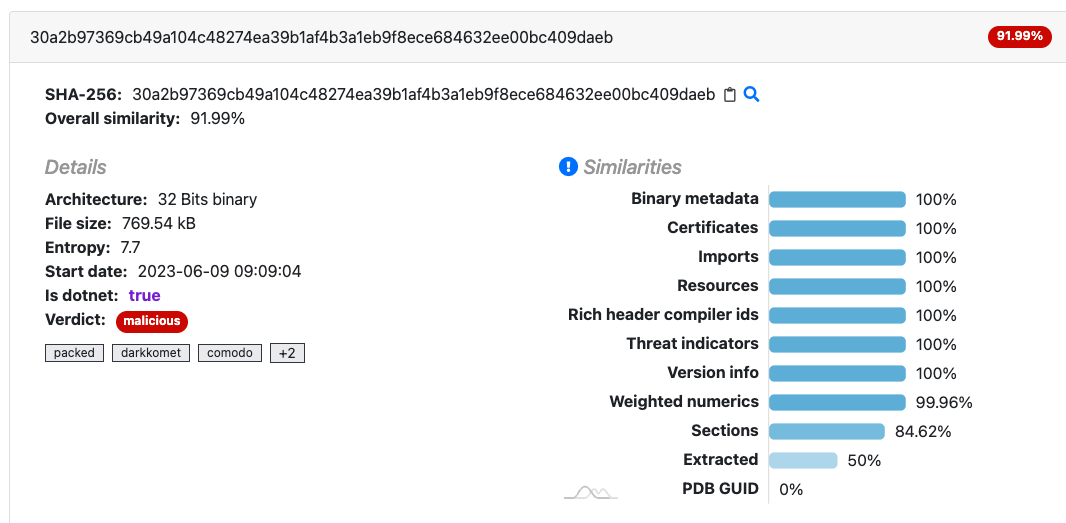
- Emulation metadata parsing from self-extracting archive files
- Detection of appended files in images with steganography
- Administrative feature to overrule scan report verdict
- Detection of file executions initiated by msiexec on remotely fetched MSI files
Changed:
- Extended certificate whitelisting with QT Framework signatures
- Extended Filescan Reputation API with support for IPs, domains and URLs
- Extended Filescan Fuzzy Hash blacklist hits with additional details
- Optimized JPG processing speed
- Fine -tuned YARA rule behaviors
- Fine-tuned fuzzy hash lookup verdict contribution
- Improved RTF emulation success rate
- Enhanced startup time with lighting fast speed and performance
- Improved verdict calculation
Fixed:
- Service stability issues
- Service availability issues via automated restart mechanism
- Backend disk usage issues
- Backend service error handling issues
- Phishing URL detection issues
- OSINT provider verdict standardization issues
Release: 1.7.4
Date: 20 April, 2023
Added:
- Added Status Page to inform users about historical health
- ‘What is your opinion about this sample’ vote feature, to influence accuracy of the Filescan verdict engine by users
- Reputation API with improved performance to provide overall verdict for SHA256 hashes, based on different trusted sources
- Yara rules now available in offline mode (static database, updated with each release)
Changed:
- Support for additional file types (TNEF, OneNote)
- Improvement on verdict precision (ex.: detect invalid digital certifications as malicious, detect suspicious Python patterns)
Fixed:
- Product installer - several native dependencies and Python packages are bundled into the installer, reducing installation time and potential issues
- Verdict inaccuracies
Release: 1.7.3
Date: 10 February, 2023
Added:
- Trends page added - statistics on global trends and recent activities
- OPSWAT license activation solution added
- MetaDefender Multiscanning
- FSIO Fuzzy hash lookup
Changed:
- Verdict precision
- Fuzzyhash blacklist in OSINT section
Fixed:
- Product installer
- Verdict inaccuracies
Release: 1.7.2
Date: 10 February, 2023
Added:
- OPSWAT Reputation lookup integration, including performance boost for the verdict
- Configurable retention policy (based on age/verdict)
Changed:
Improvements on:
- Emulation engine performance
- Support for air gapped environments
- FP/FN ratio, especially for PE installers
- Number of threat indicators
Detection of INNO installers
Fixed:
- Fix PDF parser issues
- Text and date format
- File re-scan job
- Various improvements on verdict accuracy
- Scan progress accuracy
Release: 1.7.1
Date: 19 January, 2023
Added:
- Mime type composition overview for archives
- File upload and time estimate for large file uploads
- Added file extraction for MSI installers
- Added archive verdict based on all child items
Changed:
- Improved MSI installer detection (heuristic)
Fixed:
- Fixed a rare concurrency issue with the refresh token
- Fixed an issue where some child item reports would only appear belated in the overview page
- Various minor fixes
Release: 1.70
Date: 16 December, 2022
Added:
- Support for VHD(x) file formats
- Added a logo picker that can be used to re-brand the product
- Added the option to disable the T&C accept checkbox (admin backend)
- Added the option to specify the product name (admin backend)
- Added better support for large PE files (>100MB)
- Added new threat indicators covering CPL file anomalies
- Added 'runYaraRulesOnInputFileMaxFileSizeInMb' for better control on when to skip YARA being applied to the input file
- Added media-type based prioritizing of archive files
- Added separately configurable max. processing thresholds for archive submissions
- Added media type to the /submit endpoint response (fsBroker)
- Added composition fields containing counters for all submitted, accepted and rejected files
Changed:
- Updated emulation engine
- Updated documentation (added troubleshooting guide)
- Improved heuristic javascript/vbs/powershell detection for text files without a suffix
- Default max. file size for processing is now 2GB
Fixed:
- Some potential performance issues with statistics related DB queries
Release: 1.63
Date: 28 November, 2022
Fixed:
- remove "null"-byte padding from Javascript, which was throwing off the emulator
Release: 1.62
Date: 28th of November, 2022
Fixed:
- fsBroker retry attempts would only try one time (verifyAppServersAreAvailableRetryMax) breaking automatic service restarts on slow machines
Release: 1.61
Date: 25 November, 2022
Added:
- Added support for ASF file parsing (WMV)
- Added support for CAB archives
- Added a capability to restart webservice without rebuilding docker
Changed:
- Updated emulation engine
- Updated documentation
Fixed:
- Fixed a false positive for DOTM files containing URLs
Release: 1.60
Date: 28 October, 2022
Added:
- Added ability to extract and validate certificate data from OOXML files
- Added sample feed (public/private) with archive downloads
- Added support for CustomXMLParts
- Added support for the Format function
- Added "runWebserviceHealthCheckGracefulExitIfLastSuccessOlderThanXSec" to initiiate a soft restart in a rare deadlock scenario
- Added support for ACE files
- Added support for Microsoft Store apps ("ms-appx" tag and mime-type "application/vns.ms-appx")
- Added ability to specify multiple VirusTotal API keys in fsTransform
- Added ability to disable OSINT cache (see 'enableOSINTCache')
- Added ability to abort additional OSINT lookups if malware found (see 'abortOSINTLookupIfAnyProviderFoundMalware')
- Added a configurable "dark mode" for the webservice UX
- Added a beta-version of "Rapid mode" and individually configurable analysis options on the submission dialogue (admin-only)
Changed:
- Performance improvements for OOXML files with many AX controls
- Improved detection of embedded PE files
- Improved the performance of webservice background jobs
- Improved handling very large (50MB+) PDF and PE files
Fixed:
- Fixed a few minor bugs in the emulation engine
Installation Guide
1) Navigate to “RELEASE” and download "FileScanIO Quick Start Guide”
2) Download "fsBootstrap.zip" and "FileScanIO.zip" (~779 MB)
SHA-256 fsBootstrap: 77f73891e16d3b2aced1c8a0a71f02ed26c95b589fc2ad190bf488bfde72632d
SHA-256 FileScanIO.zip: e2c4edb921c9ef0fcedf22a0172adcaf3e2bac3519bc9c02598c6180e2d33ae5
3) Follow the "FileScanIO Quick Start Guide" and use the fsBootstrap password fsBootstrap 1.7.0 password: CUT9g2fPadWgH0tHM8gM as per guide.
Note: please take note of the system requirements as outlined in the guide. As a general guidance, the better the hardware (CPU/RAM/Disc IOPS), the better the overall system performance.
ARCHIVE
fsBootstrap 1.6.3 password: uLDHMMG4aGNlp6F0aUzI
fsBootstrap 1.6.1 password: JKHh8QE7EuquMFsNihP9
fsBootstrap 1.60RC1 password: k6HDFq5FZN3HnIp8NM7G

